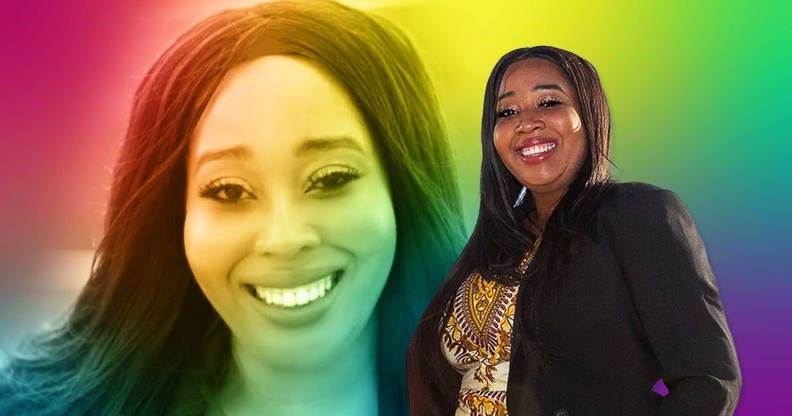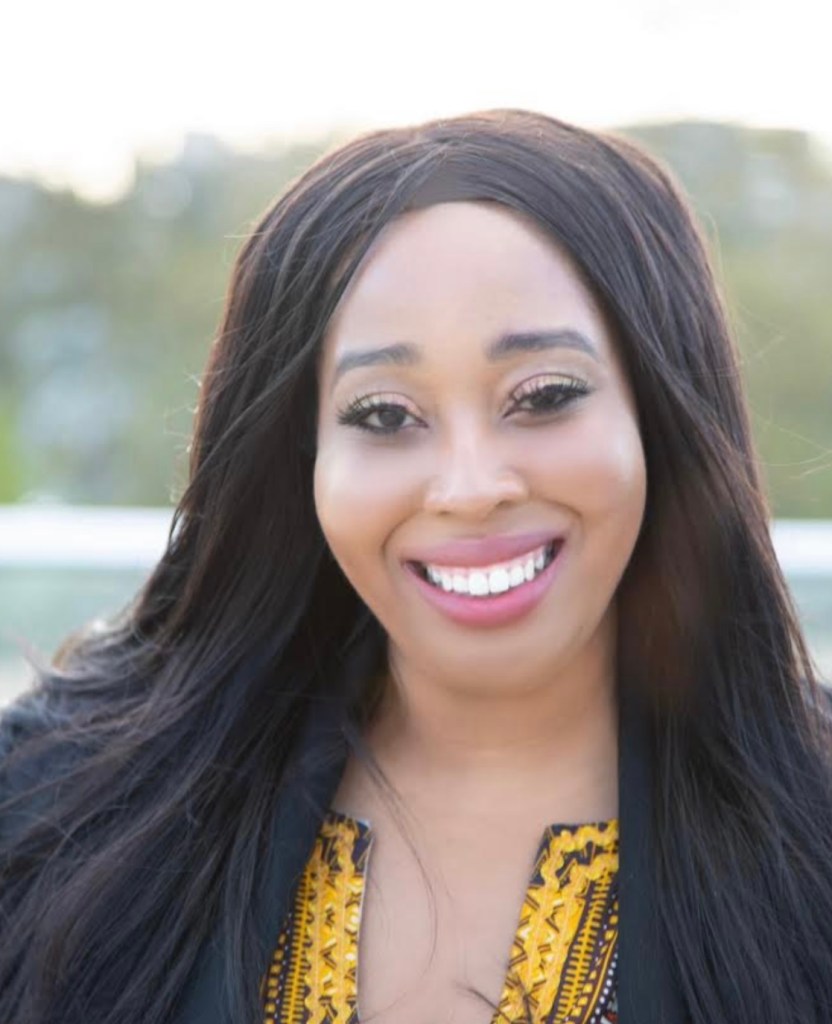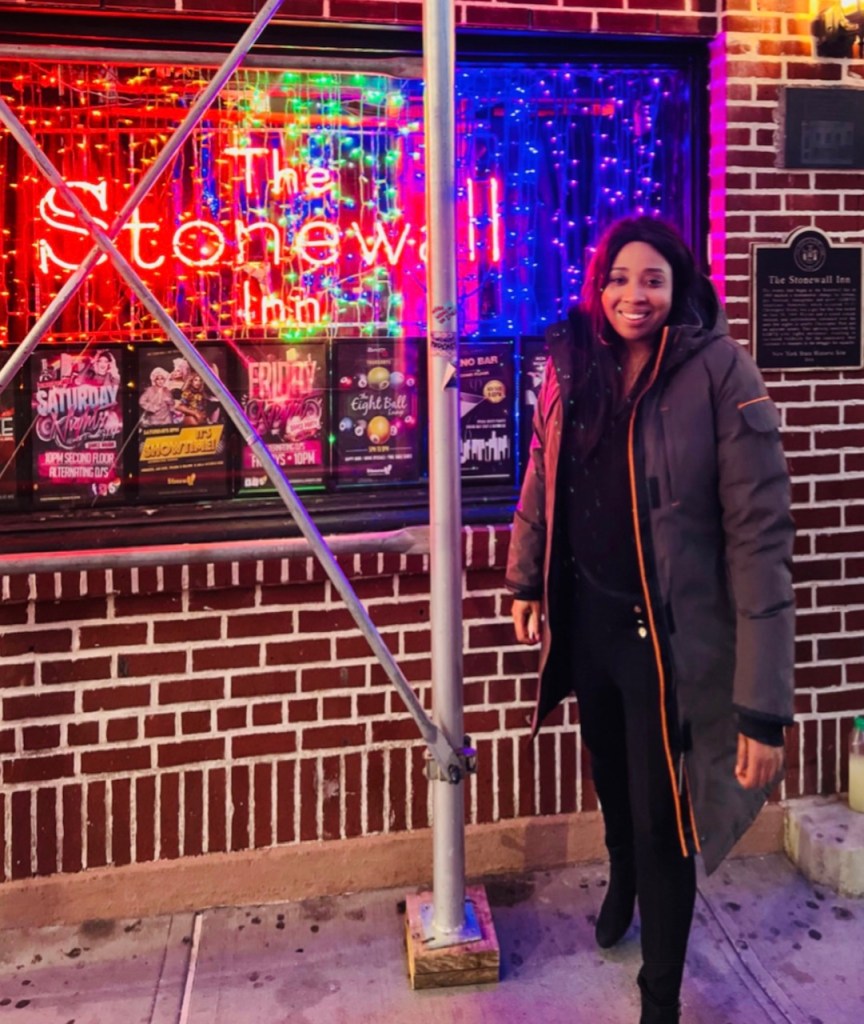As a Black lesbian lawyer I initially felt isolated – but things are changing for the better

Jacqui Rhule-Dagher talks about her “day” job and her “gay” job. (Fiona Freund/PinkNews)
Solicitor Jacqui Rhule-Dagher tells PinkNews how her experiences as a Black lesbian woman have shaped her experiences as a lawyer – and how she’s using her platform to push for change.
Growing up, Jacqui Rhule-Dagher always knew that a career in the legal industry would be her path.
“I always wanted to go down the legal route because I wanted a career that was dynamic, involved lots of research, was very cerebral and which enabled me to work with a variety of different clients, across different sectors,” she says.
After studying at Durham University, she worked as a solicitor at some of the UK’s top law firms, including her current position in the complex litigation group at Hogan Lovells, in London.
The law is her “day job,” during which she assists clients with a number of issues, including fraud, misrepresentation, breach of contract, and shareholder disputes, while also taking part in diversity, equity and inclusion (DEI) initiatives.
But she also has what she calls a “gay job,” where she is committed to supporting other queer lawyers through her work on the steering committee of the Law Society’s LGBTQ+ Solicitors Network.

“I’m one of 16 lawyers on the committee. We are responsible for ensuring that LGBTQIA lawyers in England and Wales are thriving, not just surviving, within the legal industry,” she says.
Speaking from the perspective of a Black lesbian lawyer, she adds: “Things are much better now than they used to be. When I first entered the legal industry, it’s fair to say that it was a very conservative, very traditional and very homogenous industry.
“People tended to think that DEI initiatives were either ‘nice to have, but categorically not a necessity’, or ‘self-indulgent frivolities which were something of a distraction’.
“I never spoke about my sexuality. But now I’m very open, notwithstanding first and foremost I am a lawyer. I have so much more to offer the city than my sexuality.
“I’m very happy that I work for an organisation where I can bring my authentic self to the workplace and where I’m just able to just get on with my job like the rest of my colleagues.”
Defining intersectionality
Rhule-Dagher also spends a good amount of her time raising awareness around the concept of intersectionality – something that’s often misunderstood and taken out of context.
“The term intersectionality was coined by Professor Kimberlé Crenshaw in 1989,” Rhule-Dagher explains.
“Crenshaw highlighted legal cases where people were required to choose between bringing a claim in racism or sexism, but they could not say they had been discriminated against due to the combined effects of racism and sexism.”
In one of the cases, she went on, the judge ruled that permitting someone to bring a claim for both sexism and racism, would allow them “two swings of the bat.”
Essentially, intersectionality describes how characteristics such as class, gender, race, and other personal characteristics, combine, overlap and intersect with one another.
“So, it’s not just a question of me being Black, and female and a lesbian, but rather how the combination of those characteristics means that I navigate the world differently,” Rhule-Dagher says.
“Whenever I talk about intersectionality, I remind people that I may experience racism differently to a Black man by virtue of my gender, and I may experience homophobia and sexism differently to a white lesbian by virtue of my race.”
Sage advice
Rhule-Dagher stresses how her career has benefitted from her being able to bring her authentic self to work, but she does note that it took a while to get to that point.
“For the longest time, I felt I was too Black to be a lesbian, and too much of a lesbian to be Black. It’s something that used to sit heavily on my heart.”
She was given sage advice by a lesbian senior associate at another law firm. “She said: ‘Jacqui, what’s important is that you’re known as a lawyer who happens to be a lesbian, and not a lesbian lawyer’.”
Above all else, Rhule-Dagher is committed to producing top-class work and putting her clients first. “By taking my authentic self to the workplace, I’ve had the opportunity to interact with a number of different people across the firm”, she goes on to say.
“I can also build more meaningful relationships with my clients and colleagues because I’m not hiding this aspect of my personality.”

She also believes that visibility is key and remembers how life-affirming it was to see other lesbian lawyers and how their sexuality wasn’t impeding their career progression.
“If you don’t see people who look like you, you can start to think there’s something wrong with the way that you look. This is certainly how I felt.
“I remember how frightening and isolating it was when I first started out in the legal industry, so I’m hoping that by being visibly out, I can prevent others feeling this way.”
This is one of the reasons why she founded Legally Lesbians during Lesbian Visibility Week earlier this year. She connected with more than two dozen other lesbian lawyers, who wrote about their careers and the importance of lesbian visibility.
“I hope this initiative inspires others to pursue a career in law.”
Rhule-Dagher uses the term “lesbian” proudly, especially given the current backward slide in the rights of LGBTQ+ people in some parts of the world. She also notes that through her understanding of intersectionality, she doesn’t have to “fit into this narrow view of what a lesbian is” and only “need[s] to make sure the label works for me and that it’s comfortable.”
She does acknowledge, however, that in a world where visibility often defines acceptance, a poignant truth emerges.
“Just because you don’t come out, it doesn’t mean you’re not part of the community. You’re just as important and your feelings are just as significant and valid.
“Hopefully, one day, you will feel that you’re in the position where you can come out and use a label that works for you. If you don’t, that’s also fine.”
How did this story make you feel?

